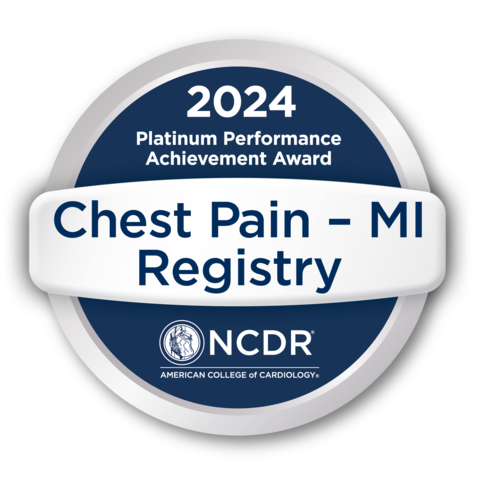Sharon Regional Medical Center Among Nation’s Top Performing Hospitals for Treatment of Heart Attack Patients

American College of Cardiology NCDR Chest Pain ̶ MI Registry Platinum Performance Achievement Award recognizes sustained, high level performance in quality of care
Sharon Regional Medical Center has received the American College of Cardiology’s NCDR Chest Pain ̶ MI Registry Platinum Performance Achievement Award for 2024. Sharon Regional is one of only 259 hospitals nationwide to receive the honor.
The award recognizes Sharon Regional’s commitment and success in implementing a higher standard of care for heart attack patients and signifies that the hospital has reached an aggressive goal of treating these patients to standard levels of care as outlined by the American College of Cardiology/American Heart Association clinical guidelines and recommendations.
To receive the Chest Pain ̶ MI Registry Platinum Performance Achievement Award, Sharon Regional has demonstrated sustained achievement in the Chest Pain ̶ MI Registry for two consecutive years (2022 and 2023) and performed at the highest level for specific performance measures. Full participation in the registry engages hospitals in a robust quality improvement process using data to drive improvements in adherence to guideline recommendations and overall quality of care provided to heart attack patients.
"It is an honor to award Sharon Regional Medical Center with the Platinum Performance Award for their valuable national leadership and dedication to meeting comprehensive performance measures in patient care," said Michael C. Kontos, MD, FACC, chair of the NCDR Chest Pain- MI Registry Steering Subcommittee, and cardiologist at Virginia Commonwealth University Medical Center. "The receipt of this award indicates that Sharon Regional remains committed to providing top quality, guidelines-driven care for heart attack patients. Their success ensures patients are receiving the highest quality cardiovascular care."
The Centers for Disease Control estimates that over 800,000 Americans suffer a heart attack each year. A heart attack occurs when a blood clot in a coronary artery partially or completely blocks blood flow to the heart muscle. Treatment guidelines include administering aspirin upon arrival and discharge, timely restoration of blood flow to the blocked artery, smoking cessation counseling and cardiac rehabilitation, among others.
“Sharon Regional Medical Center adheres to the highest standards for heart attack care and is proud to be the only accredited Chest Pain Center in the Shenango Valley,” said Jodi Gurgiolo, RN, BSN, Chest Pain Coordinator at Sharon Regional Medical Center. “Our goal is to significantly reduce the morality rate of heart attack patients by teaching the public to recognize and react to the early symptoms of a possible heart attack, reduce the time it takes to receive treatment, and increase the accuracy and effectiveness of treatment.”
Chest Pain - MI Registry empowers health care provider teams to consistently treat heart attack patients according to the most current, science-based guidelines and establishes a national standard for understanding and improving the quality, safety and outcomes of care provided for patients with coronary artery disease, specifically high-risk heart attack patients.
The American College of Cardiology (ACC) is the global leader in transforming cardiovascular care and improving heart health for all. As the preeminent source of professional medical education for the entire cardiovascular care team since 1949, ACC credentials cardiovascular professionals in over 140 countries who meet stringent qualifications and leads in the formation of health policy, standards and guidelines. Through its world-renowned family of JACC Journals, NCDR registries, ACC Accreditation Services, global network of Member Sections, CardioSmart patient resources and more, the College is committed to ensuring a world where science, knowledge and innovation optimize patient care and outcomes. Learn more at www.ACC.org or follow @ACCinTouch.
